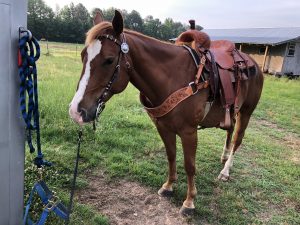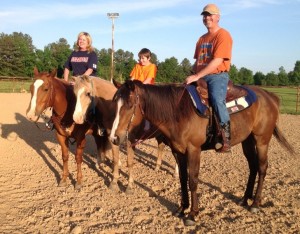 Saturday morning, Knockout and I started out on a relaxing pasture ride.
Saturday morning, Knockout and I started out on a relaxing pasture ride.
We rode through the arena, out into the back pasture, where we checked the cattle. We crossed the creek and headed toward the back corner, where we entered the woods. We meandered thru several loops of woods trails, crossing creeks as we went.
It was one of those wonderfully light rides where everything feels effortless. My cues were light and Knockout was soft and responsive.
Yes, I was directing Knockout, but not in an overbearing way. It was more of a conversation, where I politely asked and Knockout willingly responded. Sometimes, Knockout anticipated before I asked and I just went with him. Other times, Knockout suggested a turn and I said no…but even the no was light and Knockout’s response was soft.
It was wonderful!
Then we turned up toward the gate to the front pasture.
At first, Knockout willingly complied…but then he started drifting right toward the arena. I brought him back toward the pasture gate…and he promptly drifted right, again. We did that several times, then Knockout tried going left. I brought him back to center and he over-responded going too far right.
Knockout’s intent was clear. He didn’t want to ride in the front pasture. He was ready to go back to the arena and unsaddle. Knockout was ready for the ride to be over.
I’ve dealt with this sort of dodgy behavior before, so it was not a big deal. I gathered the reins in both hands, holding them wide, low, and forward with just a small amount of slack. This left Knockout with restricted freedom between left-and-right rein pressures. So long as he stayed in the middle there was no pressure, but if he turned his head to either side he ran into pressure.
At the same time, I reinforced the rein pressure with leg pressure, holding my body firmly forward so that any turns to left or right were countered with simultaneous rein and leg pressure.
That is how we rode thru the pasture gate…with Knockout trying to dodge left or right while I held him firmly to a forward path.
Once thru the gate, Knockout settled a bit and we continued our ride without further incident.
Do you see what happened, there?
The whole first half of our ride was smooth and light…enjoying each other’s presence…attentively listening to each other…respecting each other’s input. The whole first half of our ride, Knockout was actively seeking and following my will. I was polite and soft with my direction and Knockout was willingly responsive. I barely touched the reins, because there was simply no need. My seat, legs and reins were used for communication, rather than for forcing my will on Knockout.
But when I pointed Knockout toward the pasture gate, that all changed.
Knockout was not disobedient or disrespectful. He still followed my cues. Knockout still went where I told him to. But he stopped seeking my will. He stopped seeking to please me.
Rather than willingly responding to a light cue, he started ignoring the light cues…as though he hadn’t heard my ask.
When I reinforced the light cue with a firmer cue, rather than appropriately responding, Knockout over-responded. I asked for a step right, and he took three steps right.
Knockout was still following my rules…but he was no longer seeking my will. Knockout stopped using my soft cues as a communication tool to understand and do my will. Instead, he began over-responding to my firmer cues in an attempt to use my cues to accomplish his will.
At that point, Knockout reverted to legalism.
For that stretch between the end of one woods trail to the front pasture gate, Knockout was rigidly following firm rules with no regard for my will. For that short stretch, our relationship ceased to be about understanding…and reverted to rigid rules-following. Knockout responded to my cues, not by seeking my will, but by swinging too far one way, then too far the other.
This is what we do when we attempt to use the Bible to replace the work of the Holy Spirit. We start seeing scripture, not as a revelation to draw us into relationship with Christ, but rather as a mystical rule book filled with rigid rules of behavior complete with exception clauses and loop holes to be broadly enforced in all life circumstances. The more we focus on ‘the rules’ the less attention we pay to pursuing God’s heart…because we assume we’re abiding in His will by following ‘the rules.’
Much like Knockout obeyed my cues while ignoring my will, we attempt to follow God’s rules while completely missing God’s heart.
Scripture is not intended to tell us what to do in all of life’s circumstances. Scripture is intended to lead us into a personal relationship with Jesus Christ through the Holy Spirit. The written word is intended to be just one of multiple means of communication between us and God.
Yes, scripture is important…very important…much as my reins are important while riding. When the relationship is working well, the reins are a communication tool to help telegraph my body language, rather than an enforcement tool to impose my will.
Trying to live a life pleasing to God by simply following scripture, without listening to the Holy Spirit, would be like Knockout following my prompts without trying to discern my will. Yes, we eventually got thru the pasture gate…but it was a lot harder than necessary and not very enjoyable for either of us.
Rigid rules and inflexible edicts are a form of communication…but they tend to lead toward resistance rather than understanding.
Jesus came to show us the Father’s heart…and He sent the Holy Spirit to lead us in understanding.
You search the Scriptures because you think that in them you have eternal life; it is these that testify about Me; and you are unwilling to come to Me so that you may have life. (John 5:39-40)
For God so loved the world, that He gave His only begotten Son, that whoever believes in Him shall not perish, but have eternal life. For God did not send the Son into the world to judge the world, but that the world might be saved through Him. (John 3:16-17)
Jesus said to him, “Have I been so long with you, and yet you have not come to know Me, Philip? He who has seen Me has seen the Father; how can you say, ‘Show us the Father’?” (John 14:9)
These things I have spoken to you while abiding with you. But the Helper, the Holy Spirit, whom the Father will send in My name, He will teach you all things, and bring to your remembrance all that I said to you. (John 14:25-26)
So, how can we know when we’ve gravitated toward legalism rather than relationship?
Scripture provides a good measuring stick:
He has told you,
O man, what is good;
And what does the Lord require of you
But to do justice, to love kindness,
And to walk humbly with your God? (Micah 6:8)
When defending doctrinal position leads us to focus on arrogantly telling people how they should behave, rather than on justice and kindness, it’s a sure sign we have let legalistic rules blind us to God’s heart.
Jesus said it even more succinctly:
A new commandment I give to you, that you love one another, even as I have loved you, that you also love one another. (John 13:34)
Love others as Christ loves us. This is our commission. This is our calling. This is what it means to be a follower of Christ.

